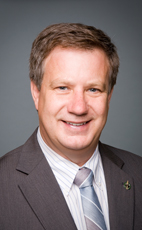Mr. Speaker, I welcome the opportunity to speak today on this issue. Indeed, last Sunday, March 22, was World Water Day. The international theme this year was water and sustainable development.
Water is a vital issue to Canadians, essential to their health and their environment. Water is equally essential for the success of many key economic sectors in Canada, from tourism and recreation to farming, energy, and manufacturing.
Environment Canada coordinates environmental policies and programs and works for a clean, safe, and sustainable environment. It works to ensure we understand water quality and quantity issues that affect Canadians' access to clean water, and it implements regulations to protect our water.
Environment Canada takes the federal lead on water matters, including scientific monitoring and research, programs, regulations, and partnerships. Partnerships are very important, because water is a shared jurisdictional responsibility among federal, provincial, territorial, and municipal governments and individual citizens. Water crosses boundaries from province to province and between Canada and the United States.
Our government is committed to partnerships with many implicated stakeholders to protect our water resources. Governments in Canada are moving to an integrated ecosystem that is designed to ensure that decision making is co-operative and reflects the interests of many stakeholders. It is also designed to balance a range of goals, including sustainable water and aquatic resource measurement, protection from health threats linked to water quality, protection of aquatic ecosystems and species, and reduction of the health, economic, and safety impacts of floods and droughts.
Our government coordinates and makes many targeted investments in ecosystems like the Great Lakes, the St. Lawrence River, Lake Simcoe and southeastern Georgian Bay, and the Lake Winnipeg basin.
Environment Canada leads the federal Great Lakes program, including implementation of the Canada-United States Great Lakes Water Quality Agreement, 2012, the Canada-Ontario Agreement on Great Lakes Water Quality and Ecosystem Health, 2014, the Great Lakes nutrient initiative, and the Great Lakes action plan, among other specific initiatives.
Through the Lake Simcoe and southeastern Georgian Bay cleanup fund, our government is investing $29 million from 2012 to 2017 to support community-based projects that demonstrate on-the-ground actions to reduce phosphorus discharges from urban and rural sources. This would help to protect and create aquatic habitat and enhance research and monitoring for decision making.
The St. Lawrence action plan, 2011 to 2026, is the latest agreement between Canada and Quebec, intended to conserve and enhance the St. Lawrence River. It builds on four previous agreements implemented since 1988.
Our government and the government of Quebec collaborate on about 50 specific projects, which all aim to achieve three main goals: biodiversity conservation, improved water quality, and sustainable resource use.
Since 2007, through the Lake Winnipeg basin initiative, our government has allocated a total of $36 million toward Environment Canada-led efforts to support the cleanup and long-term sustainability of Lake Winnipeg and its basin. An allocation of $18 million was made toward this in 2012.
Through this initiative, Environment Canada collaborates with other governments and stakeholders on scientific research and monitoring, nutrient management strategies, and financial support for stakeholder-driven, solution-oriented projects aimed at reducing nutrient loads and improving the ecological health of the Lake Winnipeg basin.
The next round of project funding under the Lake Winnipeg basin stewardship fund is being considered right now and will be announced this spring.
In the Atlantic region, through undertakings such as the Gulf of Maine initiative, funded under the national conservation plan, and the Atlantic ecosystem initiatives, significant results are achieved in improving water quality across near-shore and coastal watersheds.
At the heart of federal efforts to protect water quality for Canadians are some 700 scientific and technical professionals at Environment Canada who do field work or conduct leading-edge research about the health of aquatic ecosystems.
Environment Canada's freshwater quality monitoring and surveillance division focuses on regular monitoring, surveillance and reporting on freshwater quality and aquatic ecosystem status and trends. Its activities help to do the following. They help to assess threats to freshwater quality in the aquatic ecosystem areas I have already described. They meet federal commitments related to transboundary watersheds, rivers and lakes crossing international, interprovincial and territorial borders. They support the development, implementation and assessment of federal regulations, including the chemicals management plan, the clean air regulatory agenda, the federal sustainable development strategy and the Canadian environmental sustainability indicators.
Environment Canada has a network of laboratories that deliver world-class accredited science that supports the department's priority water programs. Environment Canada has eight operational units at seven laboratory facilities located in North Vancouver, Edmonton, Saskatoon, Ottawa, Burlington, Montreal and Moncton.
Through all these efforts, our government is actively protecting the environment and Canadians from harmful pollutants. We understand that our success depends on effective collaboration within Canada among all levels of government, with our local stakeholder partners who have local expertise, with aboriginal governments with traditional knowledge, and between Canada and the United States.
The impacts of microplastics, including microbeads, are being investigated. Our government is closely following new developments on microplastics as they become available. Academic literature is currently identifying that the sources of microplastics are found in some personal care products. These personal care products, like facial scrubs, do contain microbeads.
We are aware of legislative developments in jurisdictions like Ontario and Illinois, planning to ban microbeads in personal care products. We understand that the personal care products industry is also currently exploring opportunities to reduce the use of microbeads.
Canada is actively participating in international discussions on the prevention of marine plastic pollution, notably through the Organisation for Economic Co-operation and Development and the United Nations.

